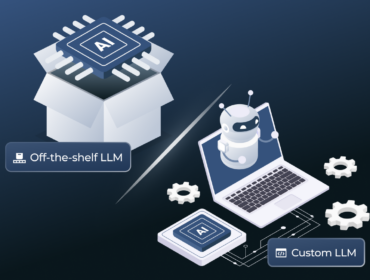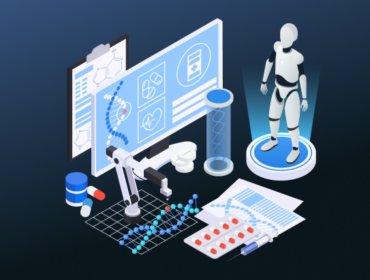Artificial intelligence is a technology that developers use to create applications, services, and programs that are capable of learning and decision-making. In other words, it is an alternative to human activity that minimizes the probability of errors by utilizing a high level of analytics.
The development of AI allows for the introduction of new software tools into business, helping to improve security and the effectiveness of marketing campaigns, optimize costs, increase efficiency, and automate a variety of business processes.
This article will take a closer look at AI and its various applications in e-commerce.
How to use AI online trading?
By 2021, 51% of e-commerce players have implemented automation technologies across sales, marketing, and customer service teams to ensure a seamless user experience for customers.
Artificial intelligence is driving companies to integrate sales, marketing, advertising, customer service, and even logistics departments into a single data structure where data quality and completeness are the number one priority.
When all business data is collected and stored properly — without loss or duplication, without format violations, and if all connections are logically limited — then this data can be used to train artificial intelligence for further extrapolation. With access to properly structured data, AI is capable of delivering high-quality analytics, solving complex business problems, and improving processes and the overall customer experience.
Artificial intelligence in e-commerce marketing helps accelerate sales cycles by fine-tuning the decision-making process to deliver a compelling sales message to your consumers at the right time, on the right platform.
Shortlist of AI capabilities in online retail
- Predict future conversions. By tracking all user actions on the site and in the application, you can predict what kind of purchase and when the shopper will make without having to target them with “extra” advertising. Rather, you can increase rates at the most opportune moment.
- Increase ROI (return on investment) for advertising campaigns. By optimizing the targeting of advertising campaigns, AI allows you to reduce your advertising budget without losing sales. Those visitors who are not yet ready to buy will be excluded from advertising segments or automatically reduced rates.
- A “smart assistant” that helps customers find the products they need. With the help of AI, you can improve your site’s search logic and create a chatbot that will help visitors place orders at any time.
- Personalized offers only. By tracking every point of interaction with a customer, all products viewed by customers, and all the prices they responded to, you can create a personalized pool of goods and offers for each buyer.
- Predict the customer journey. Based on the recommendations of artificial intelligence, you can make the path to purchase as comfortable and convenient as possible while gaining a competitive advantage through flexible margins and the ability to evaluate the effectiveness of a future marketing plan. In addition, you can improve offline sales points. Collect data from sensors and video cameras to track how customers move in your store — how they navigate, where they stay longer, and which racks are left unattended.
- Reduce human error in supply chain planning. Achieve complete real-time inventory visibility.
- Detect problems before they occur. AI technology allows you to be notified about anomalies or suspicious transactions, supplier activities, and potential fraudulent charges, all while there is still time to intervene and isolate what is happening.
AI in e-commerce
Smart recommendations are changing how e-commerce websites serve their customers.
Nike, for example, will encourage you to rethink your potential shoe purchase by showcasing several other compelling options. This is what’s known as upselling and cross-selling. While visitors are browsing a product page, product recommendation systems use the opportunity to suggest some better options and additional products to entice the customer to make an additional purchase.
There is another area where e-commerce personalization is used and that is for out-of-stock or 404 pages. From the seller’s point of view, these pages can be a real mood killer for a buyer. Undoubtedly, this is a huge inconvenience. So instead of redirecting to other pages of the website or displaying an error message on the page, these pages display:
- Bestsellers to attract more products to your customers
- Browsing history to showcase products based on the customer’s online search footprint
Items related to their browsing history
- Products similar to those that the buyer is interested in.
Another example is North Face, which uses IBM’s Watson AI solution to better understand its consumers. With the latter, the company helps its users find the perfect apparel by asking questions like “where and when will you use your running clothes?” Clients can respond by saying or writing a response. The IBM software then scans hundreds of products to find ideal matches based on real-time customer feedback while looking up the weather conditions in the area. Another notable application of AI is sales forecasting. AI helps analyze huge amounts of data and offers useful insights based on customer buying patterns.
How can small and medium-sized online retailers benefit from AI?
When we talk about AI in e-commerce, we should include small and medium-sized online companies that are now considering integrating AI into their online stores. What’s in it for them?
- Convenience. Benefits such as personalized recommendations, ease of reordering, voice assistants, and chatbots all benefit the merchant as much as their customers in terms of saving thousands of dollars and time.
- Speed . Think about quickly solving a problem. Things like fast shipping and one-click shopping with streamlined checkout processes give your website the speed it needs.
- Warranty. Customer privacy and security standards are raised once you integrate AI into your store. Your client feels safe and you trust them.
- Accuracy. Things like geolocation, reviews, and exact arrival dates help build trust and get people to contact you more often.
- Experience. Customers appreciate the elements of a pleasant surprise and like to try unusual technologies such as visual and voice search. It gives them a sense of participating in something “unique”.
What’s next?
Perhaps one day we will reach some war of robots against humanity, but for now, we can look forward to using computer technology to make life easier and safer. Whether you’re looking to increase the effectiveness of advertising, optimize costs, save time on preparing content and communicating with users, artificial intelligence technologies can help your business adapt to the reality of information-backed competition.





![Practical Use of AI in E-commerce What’s the EU Artificial Intelligence Act and How to Comply? [Webinar]](https://unicsoft.com/wp-content/uploads/2024/03/Cover_1140_v1.1-370x280.png)

